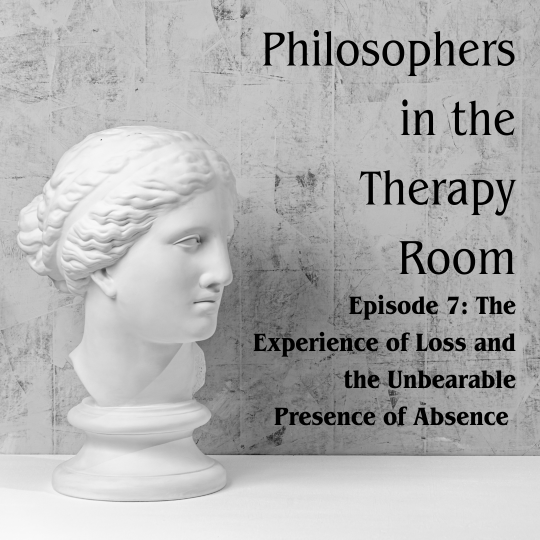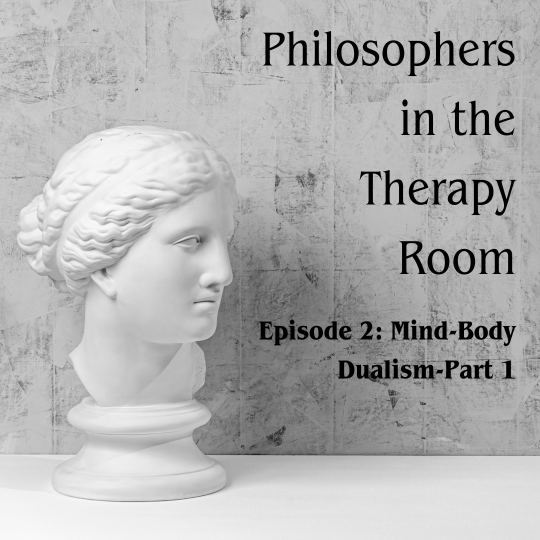
Where philosophy touches the heart, and ideas breathe life into the everydayness.
What happens when philosophy steps out of the lecture hall and into the therapy room? In this podcast, we invite you to explore the deep questions of life, loss, love, and identity through the lens of philosophical thought and psychotherapeutic practice.
Each episode is a journey-part reflection, part dialogue-where existential insights meet real-world struggles. Drawing on thinkers like Descartes, Camus, Heidegger, Spinoza, and many others, we wrestle with the complexities of being human:
- What does it mean to care?
- How do we live with loss?
- Can anger be ethical?
- How do we find meaning in a world that often feels fractured?
If you’re curious about how philosophy can illuminate the messy, beautiful realities of life, or if you want
to reimagine therapy as a place of discovery, not just recovery, this is for you. Think of it as a thoughtful conversation between your intellect and your emotions-a pause in the noise to listen, reflect, and grow. So, pull up a chair. Whether you’re a thinker, a seeker, or someone simply trying to navigate the complexities of being human, there’s space here for you.
Start listening now. Ideas are waiting…
Meet Your Hosts

Dr Hora Zabarjadi Sar
BA(Phil), MA(Edu), MPhil(Edu), PhD (Phil), MA(Counselling)

Dr Sameema Zahra
BA(Phil/Lit), MA(Phil), MPhil(Phil), PhD(Phil), MA(Counselling)
Episodes:
Episode 12- Memories without Witness: Intergenerational Trauma and the Generational Exiled
How do we remember what we never lived? How does trauma reverberate across generations, shaping identities and ways of being in the world? In this episode, we explore intergenerational trauma as a lived phenomenon, one that transcends individual experience and persists in the silence, gaps, and embodied traces of history.
Building on generative phenomenology, we consider trauma not merely as an individual affliction but as something embedded in intersubjective and historical structures. The “generational exiled”, carry histories that remain unspoken yet deeply felt. Trauma, in this sense, is not just passed down biologically or psychologically but through the very structures of experience, shaping how descendants of trauma survivors relate to time, self, and others.
Yet, if trauma extends beyond the individual, so too must healing. Generative phenomenology suggests that reconnecting with the past does not mean merely remembering but transforming our relationship with it. Uncovering the implicit narratives, gestures, and silences through which trauma endures opens possibilities for re-living history differently, not by erasing suffering but through reorienting it toward meaning, recognition, and ethical responsibility.
How can we think about healing when what needs to be healed is not entirely our own? What does it mean to bear witness to a past that still insists on being acknowledged? Join us as we navigate these questions, tracing the invisible threads that bind past and present, self and other, rupture and restoration.
Episode 11: … and the time’s rhythm now lies motionless, piling into an ever lasting present: A phenomenology of Trauma
What happens when time itself breaks? When trauma strikes, it is not merely an event but a rupture in self-temporalization—a fracture in the very way we experience time. In this episode, Dr Sameema Zahra and I turn to phenomenology and Bergsonian philosophy to explore how trauma shatters the flow of lived time, leaving the past piled into an everlasting present.
Drawing on Husserl’s internal time-consciousness, we examine how trauma fixates the past on a moment that refuses to recede, freezing the subject in an unassimilable past. Meanwhile, Bergson’s notion of pure memory and habitual memory helps us understand why traumatic experience resists integration: instead of passing into the virtual reservoir of memory, it remains actualized, replayed, and embodied as raw sensations.
Through this lens, we ask: How does trauma distort the horizon of possibilities, severing one’s ability to anticipate the future? What does it mean to live trapped within the broken hourglass of time, where experience no longer flows but solidifies into an eternal now? And can phenomenology offer a way to restore movement to time, allowing the self to re-engage with the world beyond the moment of rupture?
Episode 10: Navigating Passions : Spinoza on Affects, Intellect & a Balanced Life
What drives our action: the intellect or the passions? For Spinoza, this question lies at the heart of understanding human flourishing. In this episode, we explore Spinoza’s profound insight that intellect, while essential for understanding, lacks the intrinsic power to provoke action. Instead, it is the passions that move us. But not all passions are equal. Passive affects, which are those we endure rather than direct, can leave us vulnerable and disempowered. Spinoza argues that transformation does not arise from suppressing or intellectualizing these passive affects but from deeply engaging with them.
Through this engagement, we internalize the affect, journeying through it rather than avoiding it. This process involves uncovering the possibilities each affect holds, allowing a passive affect to give way to an active one. Active affects emerge when we align our emotions with an understanding of what enhances our power to act and our connection to the world. This is not a simple matter of rationality overriding emotion; rather, it is about reshaping our emotional landscape from within, creating a harmony that leads us closer to the good life.
Join us as we unpack Spinoza’s radical vision of emotion regulation, where the interplay of passion and intellect reveals new ways to navigate our inner worlds and move toward empowerment and freedom.
Episode 9: The Currents of the Soul: Spinoza on Affects and Transformation
In this episode, we bring the 17th-century philosopher Baruch Spinoza into the session to explore his fascinating ideas on affect and the distinction between passive and active states of being.
By ‘affect’, Spinoza refers to the body’s capacity to act, be acted upon, and experience changes in its power to exist and persevere. Affects are not just fleeting emotions; they encompass the entire spectrum of how we respond to the world. They shape our moods, motivations, and overall ability to engage with life. Spinoza helps us see how these responses are not neutral-they either enhance or diminish our power to act.
We also delve into Spinoza’s distinction between passive affects those that happen to us and diminish our autonomy and active affects, which arise when we fully understand and align ourselves with the causes of our emotions. This distinction offers a profound lens for understanding how clients might feel stuck in cycles of passivity or, alternatively, how they might find empowerment and freedom through greater awareness and agency. Join us as we unpack these ideas and consider their implications for therapy. How can understanding Spinoza’s theory of affect help us guide clients toward active engagement with their lives? And how might this philosophical framework illuminate our own practices as therapists? Stay with us as we journey through Spinoza’s thought and its relevance in the therapy room.
Episode 8: Existential Carelessness and Moral Injury
What happens when we turn away from the world? In this episode, we dive into Heidegger’s concept of Sörge (care) to reflect on what it means to be in a world that demands our attention and engagement. Care, we suggest, is not just a fundamental condition of existence—it is an ethical imperative. To stop caring, to grow indifferent, is to risk severing our relationship with the world and ourselves.
We also explore anger as a moral emotion: a signal that something we value is under threat. When we dismiss or suppress this signal, we risk deeper harm-what philosophers and therapists alike call moral injury. By ignoring these calls to care, we risk damaging our “house of being,” where meaning, ethics, and our sense of self reside. This episode invites you to rethink care as more than an individual experience. It is an ethical demand that connects us to the political, social, and global realities we inhabit a reminder that existential carelessness comes at a cost, not just to others, but to our very humanity.
Episode 7: The Experience of Loss and the Unbearable Presence of Absence
In this episode, Sameema Zahra and I explore the deeply transformative experience of loss through the lens of phenomenology, drawing particularly on Jean-Paul Sartre’s notion of “present absence.” Sartre describes how, even when someone or something is no longer physically present, their absence is still profoundly felt, shaping our lived experience as if they continue to exist in a different way. This idea of a “present absence” captures how loss lingers in our consciousness, constantly influencing how we relate to the world and to ourselves.
We discuss how, in the wake of loss, our perception of the world changes—everyday objects, places, and routines take on new significance or emptiness. The presence of the absent person or thing becomes a haunting force, reshaping the emotional and existential landscape we inhabit. This phenomenon impacts not only our external world but also our inner world, forcing us to confront the ways in which our sense of self is intertwined with those we lose.
In the therapeutic context, we explore how acknowledging and working through this experience of present absence can help clients process grief. By recognizing the ways in which the absent person still “exists” within their life, clients can begin to make sense of the changes to their emotional world, find meaning in their ongoing relationship with the loss, and navigate the reconstruction of their identity after such a profound shift.
Episode 6: Pain and the Phenomenal Body
In this episode of Philosophers in the Therapy Room, we explore Maurice Merleau-Ponty’s notion of the phenomenological body emphasizes that our bodily experience is not merely a physical or objective event but is deeply intertwined with our perception and interaction with the world. In the context of pain, this idea highlights that pain is not just a sensation located within the body but a lived, embodied experience that shapes and is shaped by our engagement with the world.
In this framework, pain is understood as a co-constructive experience, where the “phenomenal body”—the body as it is experienced and perceived—does not merely react to the world but participates in a dynamic, reciprocal relationship with it. When in pain, the body’s interaction with the world changes: our movements may be restricted, our attention might be drawn to specific aspects of our environment (like avoiding certain movements or stimuli), and the pain can alter our overall perception of the world.
Episode 5: The Unscripted Life and Existential Lucidity
In this compelling episode of “Philosophers in the Therapy Room,” we continue our exploration of societal expectations and individual fulfillment by delving into Albert Camus’ “Myth of Sisyphus” and the concept of lucidity. We examine how moments of crisis, particularly those involving a loss of meaning, prompt different responses from individuals.
Drawing from Camus’ philosophy, we discuss how people react to the absurdity of life: some may give up, feeling overwhelmed by the lack of inherent meaning; others might take excessive risks, attempting to impose their own meaning through radical actions; while some revert to the original life script, seeking solace in familiar structures. However, Camus suggests a different approach—embracing lucidity.
We explore how lucidity, or the clear and honest recognition of life’s absurdity, can be a powerful tool for navigating these crises. By accepting the unpredictability and lack of predetermined meaning in life, individuals can stay grounded, making deliberate and mindful choices within the framework of their unplanned existence.
Episode 4: Life Original Script and the Crisis of Meaning
In this thought-provoking episode of “Philosophers in the Therapy Room,” we delve into the concept of the “life script” and its profound impact on human behaviour and mental well-being. We explore how these societal expectations create a framework within which individuals are expected to operate, leading many to measure their self-worth and success against these arbitrary benchmarks. Throughout the episode, we engage with various philosophical perspectives to unpack the origins and implications of the life script. We also consider how therapy can provide a space for individuals to challenge these societal norms, redefine success on their terms, and embrace the unique trajectories of their lives.
Join us as we navigate the complexities of the life script, offering insights and strategies to help listeners cultivate a more authentic and fulfilling existence free from the constraints of societal expectations.
Episode 3: Mind-Body Dualism-Part 2- The Question of Experience
In this episode, we explore the manner in which we understand our experiences, which are intricately crafted by our senses. Imagine the symphony of sights, sounds, smells, tastes, and touches that paint our perception of reality. But how do we make sense of this sensory information? And if the mind and body are two distinct entities, as Descartes suggests, how do they work together to shape our understanding of our experiences?
At the heart of this inquiry lies a profound question: How do we bridge the gap between our bodies’ physical sensations and the intangible realm of our thoughts and consciousness?
Episode2: Mind-Body Dualism- Part 1
In this episode, we discuss René Descartes’ mind-body dualism, a foundational idea that has profoundly influenced early psychological theories and practices. We explore how Cartesian dualism has shaped our understanding of mind and body as two separate entities: Mind as a ‘thinking substance’ and Body as an ‘extended substance’, operating like a machine. Join us as we unravel these complex ideas and their lasting impact on contemporary psychological practices.
Episode 1: Prologue
Join Dr Hora Zabarjadi Sar and Dr Sameema Zahra in this thought-provoking prologue episode of “Philosophers in the Therapy Room,” where they explore the intersection of philosophy and counselling. As philosophers and practitioners, they delve into the depths of existential questions and ethical dilemmas, offering unique insights and perspectives on the unknown terrain of the human psyche. In this introductory episode, they set the stage for engaging discussions ahead, inviting listeners to ponder the profound connections between philosophy and therapy. Whether you’re a seasoned philosopher, a curious counsellor, or simply someone interested in the complexities of the human experience, tune in and join the conversation.












